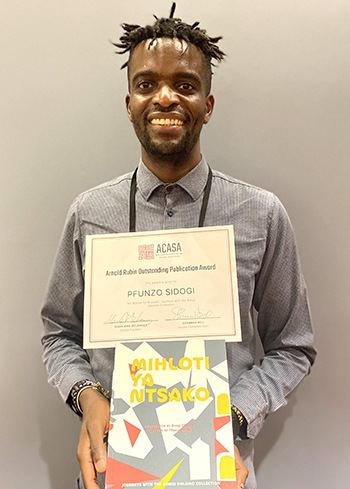by Gerrit Bester
Prof Pfunzo Sidogi, Head of the Department of Fine and Studio Arts in the Faculty of Arts and Design at the Tshwane University of Technology, won the prestigious Arnold Rubin Outstanding Publication Award in Chicago for his book Mihloti Ya Ntsako: Journeys with the Bongi Dhlomo Collection. In an interview, he talks about the journey of writing the book and the significance of these awards, which have been described as the Olympics of African art history.
Congratulations on winning the Arnold Rubin Outstanding Publication Award. How does it feel to receive such prestigious international recognition for your book, Mihloti Ya Ntsako: Journeys with the Bongi Dhlomo Collection?
I am humbled by this accolade. Winning this award validates the importance of my research, where I focus on the creative legacies of black artists from the twentieth century and, more specifically, in the case of this book, trailblazing black women artists, such as Bongi Dhlomo.
The award was presented in Chicago, America. Tell us more about the award, event and what it means to you to receive recognition in such an international setting?
The Arts Council of the African Studies Association (ACASA) is the leading global association for scholars of African arts. ACASA hosts the triennial conference every three years, during which the Arnold Rubin Outstanding Publication Award is presented in recognition of excellence in scholarship on the arts of Africa and the African Diaspora. The award was established in 1989 and this year the conference was held in Chicago, USA, where I received this top award alongside other renowned researchers.
In what ways do you believe that the themes explored in Mihloti Ya Ntsako contribute to a broader understanding of African art and culture?
The book is significant on several accounts. Firstly, it celebrates the career of Bongi Dhlomo, who has worked in the visual arts industry for over four decades. Although the book is not a conclusive biography of Dhlomo as an artist and curator, it was nevertheless used as a primary citation when she was awarded the Order of Ikhamanga in Silver by President Cyril Ramaphosa in 2023 for her contribution to the field of arts by curating creative projects that preserve significant periods in South African history. Another important contribution the book makes is its focus on the art collecting and patronage practices of black people throughout the twentieth century. The decision to name this institutional art collection after Bongi Dhlomo, a black woman artist, underscored this focus.

PROUD MOMENT! Prof Pfunzo Sidogi, Head of the Department of Fine and Studio Arts, with the prestigious Arnold Rubin Outstanding Publication Award that he received in Chicago for his book Mihloti Ya Ntsako: Journeys with the Bongi Dhlomo Collection.
Receiving the Arnold Rubin Outstanding Publication Award is a remarkable achievement. What impact do you hope this recognition will have on your work and the Fine and Studio Arts Department at TUT?
This award is indeed momentous because it is a major international recognition of my scholarship. One of my colleagues from the University of Johannesburg, Dr Landi Raubenheimer, referred to the awards event as the “Olympics of African art history”. When looking through the illustrious list of previous winners, the other South African author I spotted was Sarah Nuttall, who also received the Arnold Rubin prize in 2007, I am humbled that my name now sits alongside such great writers.
Winning this award is substantive evidence that the histories we are writing about as African researchers are important and that our scholarship is globally competitive. I hope this book and the honours it is receiving will inspire colleagues and students, especially the postgraduates in the Department, Faculty and TUT at large, to embark on original research projects that do not regurgitate what others have done.
Can you share any particular stories or experiences that stand out to you from your research on Bongi Dhlomo’s collection?
There are many fascinating aspects of this project and Bongi Dhlomo’s career that the book has tried to narrate in an accessible tone. Perhaps the most interesting untold narrative is that Bongi Dhlomo was probably the first black professional curator in South Africa during the early 1980s. Sadly, her contributions to the development of curatorship in South Africa throughout the 1980s and 1990s were not fully appreciated because she was always seen as an ‘administrator’, ‘secretary’ or ‘assistant’. The book rewrites this history and fully acknowledges her amazing role in advancing and democratising curatorial practices in South Africa over the past four decades.
How do you see the relationship between academic publications and artistic practice in the context of promoting African art on a global scale?
Academics have a massive responsibility to advance the work that artists are creating. The relationship between the artist and writer is critical to ensure that the stories and legacies of the artists are assembled, studied and turned into books and study material that can be used in the classroom. However, it should not be a hierarchal interaction. The researcher is not more important than the artist simply because of the academic title they hold.
What advice would you give to emerging artists and scholars who aspire to engage with African art and culture through their own publications?
The best advice I can give emerging scholars is to be authentic and unusual when developing and implementing a research project. During an interview after this same book was given the Best Non-Fiction Monograph award at the Humanities and Social Sciences Awards in 2023, I noted that the book probably received this prize because of two main ingredients. The first ingredient is that it contains some decent writing, which accounts for about 5% of the book’s quality. However, the more important ingredient that makes up the other 95% of the book’s excellence is that it tells a compelling story. So, emerging researchers must focus on topics or narratives that are new, unique and unchartered.
